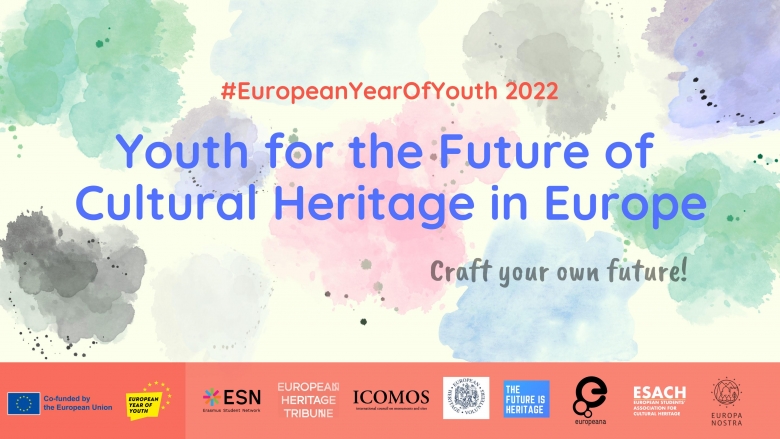Europa Nostra and its partners publish results of consultation on youth and cultural heritage in Europe
Europa Nostra and its partner organisations have published the results of the consultation on “Youth for the Future of Cultural Heritage in Europe”, with 119 responses. The consultation aimed at empowering and raising the voice of Europe’s young generation and was developed as a contribution to the European Year of Youth 2022 in collaboration with the European Students’ Association for Cultural Heritage (ESACH), the Erasmus Student Network (ESN), the European Heritage Tribune (EHT), The Future is Heritage, Europeana Initiative Diversity & Inclusion Task Force, ICOMOS and the European Heritage Volunteers.

Conducted between 20 April and 31 August 2022, the consultation focused on uncovering the perception of young people towards the heritage sector and involved participants in the age range of 18-29, encompassing a diverse range of individuals from students to trainees or managers. It addressed a wide array of topics, including post-pandemic working conditions; opportunities for young people; educational domains; sustainable development; and diversity and inclusion. The consultation was conducted via Google Forms and widely disseminated through the social media platforms of the involved partners, as well as by word of mouth in relevant contexts.
As a starting point, participants stressed the importance of mainstreaming heritage into all aspects of society. According to the results, including diverse identities and disciplines in the sector is crucial for increasing the quality of life while benefiting from the heritage and ensuring intergenerational and intercultural dialogue.
Another central theme was how youth’s skills and knowledge could be used for positive change. Looking for meaningful engagement in the sector for the development of capacity-building skills, participants expressed the need for a system that adequately supports their careers. This system could be developed through mentorship, training and professional development programmes provided by cultural organisations. The consultation highlights how career development cannot be segregated from access to education opportunities. Trainee and entry-level positions where early career experience can be gained in a professional environment were stated among the responses, as well as educational opportunities. The consultation highlights how, in the early career stages, having mentorship support and experiencing every phase of decision-making is crucial in terms of professional growth in the sector.
Additionally, responses reflect that in order for youth to engage with the sector and the conservation of cultural heritage, they must be provided with fair wages. Low pay and precarious working conditions have been identified as reasons to discourage young people from pursuing careers in the field, and the survey marks a clear call for decent financial compensation which could be provided through various funding programmes.
The consultation has encouraged the young members of Europa Nostra and its partners to develop a recommendation paper on the basis of the results. The anticipated launch of this paper took place at the end of September 2023, coinciding with our European Cultural Heritage Summit in Venice organised by Europa Nostra. During this event, young individuals had the opportunity to present the findings of the consultation to diverse partners and heritage specialists and stakeholders.
The consultation was conducted as part of Europa Nostra’s network project European Cultural Heritage Agora “Empowering Europe’s Civil Society Movement for Heritage”, which is co-funded by the Creative Europe programme of the European Union. This is one of the deliverables of Work Package 5 – Collecting and Disseminating Data, Information, Practices, Ideas and Solutions, which intends to ensure a permanent analysis and understanding of the key challenges and opportunities related to cultural heritage in Europe and beyond.
At Europa Nostra, our aspiration is to ensure that the findings benefit entities within the cultural and creative sectors and society at large. The initial significant outcome of the consultation paper was the publication of a position paper with lead partners ESACH, Europa Nostra and the Future is Heritage. This position paper is structured around five pillars, all centered on the theme of Sustainability:
1. Inclusion – Heritage as a confluence
2. Collaboration – Heritage as a collective network
3. Intergenerational exchange and dialogue – Heritage as a bridge
4. Strengthening the sector – Heritage as a future profession
5. New technologies – Heritage as an expanding field






